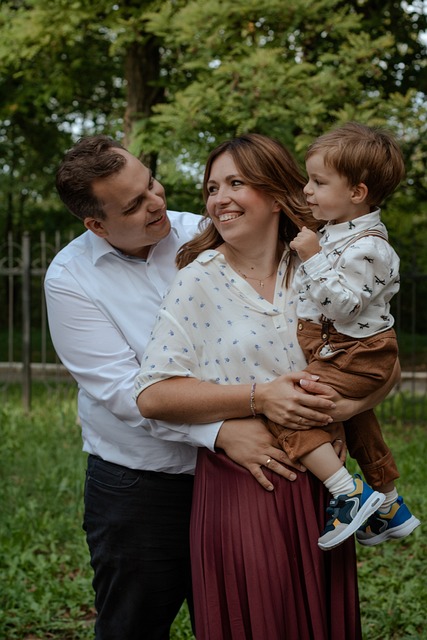Family counseling services provide a collaborative, comprehensive approach to resolving diverse family issues, from communication breakdowns to complex challenges like addiction or trauma. Through trained professionals, these services enhance communication, strengthen relationships, and teach valuable tools for managing stress, improving problem-solving skills, and promoting emotional well-being. Tailored therapies, including marriage, family, and group counseling, cater to specific needs, fostering openness, honesty, and active participation. Effective communication techniques, such as active listening and 'I' statements, are emphasized to create a safe space for sharing. Beyond immediate solutions, counseling services equip families with lasting tools for positive change, supporting long-term success and harmony within the family unit.
Family counseling services play a pivotal role in addressing and resolving issues within families. This comprehensive guide delves into the intricacies of family therapy, exploring common challenges such as communication breakdowns, conflict resolution, and emotional distance. We highlight the numerous benefits of professional intervention, including improved relationships, enhanced coping mechanisms, and lasting positive changes. By understanding different counseling approaches, establishing trust, and actively participating in sessions, families can harness the power of therapy for long-term success.
Understanding Family Counseling Services: A Comprehensive Approach

Family counseling services offer a comprehensive approach to addressing and resolving issues within families. It is a collaborative process where a trained professional, often referred to as a counselor or therapist, facilitates open communication and helps family members understand each other’s perspectives. This type of service aims to improve relationships, resolve conflicts, and enhance overall family functioning.
Counselors utilize various techniques tailored to each family’s unique dynamics. They create a safe and supportive environment where families can explore underlying issues, express their feelings, and work through challenges together. Whether dealing with communication breakdowns, parenting issues, or more complex problems like addiction or trauma, family counseling services provide a structured framework to foster positive change and strengthen familial bonds.
Identifying Common Family Issues and Their Impact

Family issues are diverse and unique, but certain common challenges often bring families seeking help through family counseling services. These range from communication breakdowns, where conflicts escalate due to misaligned expectations, to more complex dynamics like step-family integration or managing a family member’s mental health struggles. Financial strains, work-life balance problems, and parenting difficulties also frequently contribute to familial tension.
The impact of these issues can be profound, affecting the emotional well-being of each family member and potentially leading to long-term consequences if left unaddressed. Children, in particular, may struggle with security and stability, while parents might experience increased stress and a sense of helplessness. Family counseling services play a vital role in helping families identify these issues, foster healthier communication patterns, and develop coping strategies to strengthen their relationships and overall family dynamics.
Benefits of Professional Family Therapy

Family counseling services offer a safe and structured environment for families to address and overcome challenges together. One of the key benefits is improved communication; through professional guidance, family members learn effective listening skills and express their feelings openly, fostering deeper connections. This enhanced understanding leads to better conflict resolution and stronger relationships.
Additionally, therapy provides tools to navigate complex dynamics, helping each individual within the family system feel valued and heard. It equips families with strategies to manage stress, improve problem-solving abilities, and promote emotional well-being. With dedicated support, families can develop resilience, enhance their bond, and create healthier patterns for future generations.
Types of Family Counseling: Finding the Right Fit

When considering family counseling, it’s crucial to understand the various types available to find the best fit for your needs. Family counseling services can take on different forms, each tailored to address specific issues and dynamics within families. One common approach is marriage or couple counseling, which focuses on improving communication and resolving conflicts between partners. This type of therapy is especially beneficial when facing marital troubles, infidelity, or premarital concerns.
Another prevalent category is family therapy, targeting the entire family unit. It explores relationships among all members, addressing issues like parenting challenges, sibling rivalry, or the impact of a loved one’s illness. Group counseling is also an option, where families join a small group of peers facing similar struggles, fostering a sense of community and shared understanding. Each type offers unique advantages, catering to diverse family situations, ensuring everyone involved feels heard and supported throughout the therapeutic process.
Creating a Safe Space: Building Trust in Therapy

In family counseling services, creating a safe and trusting environment is paramount for successful therapy. The initial sessions are crucial in establishing this foundation; here, each family member feels heard, respected, and valued. Therapists employ active listening techniques, ensuring every voice is acknowledged, which fosters an atmosphere of openness and honesty. This process helps identify underlying issues and promotes better communication, allowing families to navigate their challenges together.
Building trust involves consistency, empathy, and non-judgmental attitudes from counselors. When family members feel secure sharing their feelings and experiences, they are more likely to engage in meaningful discussions. This safe space encourages vulnerability, enabling deeper exploration of problems and the development of healthier coping strategies within the family unit.
Active Participation: Engaging in the Healing Process

In the realm of family counseling services, active participation is a key element in the healing process. When all family members actively engage in therapy sessions, it fosters open communication and helps identify underlying issues that may have been previously overlooked. Each individual brings their unique perspective, contributing to a more comprehensive understanding of the dynamics at play within the family unit. This collaborative approach encourages accountability and promotes collective problem-solving skills, laying the groundwork for lasting positive changes.
By actively participating, family members learn effective coping strategies, enhance their emotional intelligence, and develop healthier ways of interacting with one another. The counseling process becomes a shared journey where everyone has a voice and plays an active role in creating a more harmonious home environment. This level of engagement is vital to overcoming challenges and strengthening family bonds, ultimately leading to improved relationships and well-being for all involved.
Strategies for Effective Communication within Families

Effective communication is a cornerstone of successful family counseling services. It involves active listening, where each family member pays close attention to what others are saying, both verbally and nonverbally. This practice fosters understanding by ensuring everyone feels heard and validated. Additionally, using ‘I’ statements instead of accusatory language helps express feelings without blaming, promoting healthier discussions.
Further, setting ground rules for conversations—like taking turns speaking, maintaining eye contact, and avoiding interruptions—can create a safe space for sharing. Encouraging open dialogue about emotions, concerns, and expectations strengthens family bonds. Family counseling services often teach these strategies to help families navigate challenges collaboratively, enhancing their overall well-being.
Long-Term Success: Sustaining Positive Changes

Family counseling services don’t just offer immediate solutions; they equip families with tools and strategies to sustain positive changes over time. This long-term success is a result of consistent practice and commitment to the new insights gained during therapy sessions. By learning effective communication techniques, resolving underlying conflicts, and enhancing emotional connections, families can navigate challenges more constructively, fostering an environment of understanding, empathy, and support.
Regular check-ins with counselors or therapists between sessions can also aid in maintaining momentum. These follow-up meetings provide opportunities to discuss progress, address lingering issues, and receive guidance on navigating new dilemmas. Through these ongoing interactions, family counseling services ensure that positive changes not only endure but grow stronger, creating a more harmonious and fulfilling family dynamic.
